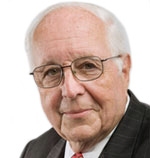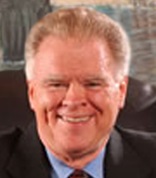By Bob Allen
The “conservative resurgence” that transformed the Southern Baptist Convention three decades ago began in the halls of Second Baptist Church in Houston, the movement’s chief architect told seminary students April 15.
 Paul Pressler, a former Texas Appeals Court justice known principally for his idea of using the appointive powers of the SBC to effect change in Baptist institutions by appointing only trustees who affirm biblical inerrancy, shared the story in a panel discussion with co-founder Paige Patterson – today president of Southwestern Baptist Theological Seminary in Fort Worth, Texas – during a celebration of the dedication of a new chapel at Midwestern Baptist Theological Seminary in Kansas City, Mo.
Paul Pressler, a former Texas Appeals Court justice known principally for his idea of using the appointive powers of the SBC to effect change in Baptist institutions by appointing only trustees who affirm biblical inerrancy, shared the story in a panel discussion with co-founder Paige Patterson – today president of Southwestern Baptist Theological Seminary in Fort Worth, Texas – during a celebration of the dedication of a new chapel at Midwestern Baptist Theological Seminary in Kansas City, Mo.
“I created a little fuss at Second Baptist in Houston,” Pressler recalled. “We had a pastor who was supporting Ralph Elliott and was lying about it.”
Elliott was a professor at Midwestern Seminary when his 1961 book The Message of Genesis sparked controversy by taking a symbolic rather than literal approach to Genesis by stressing its “theological and religious purpose” over historicity.
Pressler said he doesn’t like being misled, so he brought a resolution to the church council about it that nearly passed.
“So Johnny Baugh, who later financed the liberals, said that they’d set up a committee to study the seminaries,” Pressler said. “Well, when I saw the ones on the committee, it was a whitewash committee.”
“But one member resigned before the next deacons’ meeting, and they changed the chairman of deacons, who put me on the committee,” he said. “So I got into the middle there. We studied it. It was obvious that there were problems, and Ralph Elliott was really the catalyst for me to become concerned about it.”
That set the stage for a famous meeting to discuss a long-term strategy with Patterson, then a doctoral student at New Orleans Baptist Theological Seminary, at the Café Du Monde in New Orleans in 1967.
“As a result of this committee of deacons at Second Baptist, there was a deacon named Bill Price, who had been a deacon at First Baptist, Beaumont, [Texas] and watched Paige grow up,” Pressler said. “So he came up to me after my dispute and said, ‘Do you know Paige Patterson?’ I said, ‘I’ve never heard of him.’ He said ‘Well he’s the only other person in the world who I know of that thinks just like you do. You ought to meet him.’”
“So we got Dorothy and Paige’s name,” Pressler said. “Nancy and I were over for a layman’s conference at New Orleans. We went and knocked on Dorothy and Paige’s door, and they said, ‘We’re tired of studying; let’s go to Café Du Monde.’”
Patterson, who often clashed with professors over his conservative views, said something to his dean when he received his doctorate that proved prophetic.
“I said, ‘Dr. Kennedy, you will hear from me,’” Patterson said. “He said ‘fine,’ but I don’t think he thought much more about it, but as things worked out he did hear from me.”
The movement began in earnest in 1979, when Pressler mobilized conservative churches to send messengers to the SBC annual meeting in Houston. Pressler said he hadn’t managed to find a candidate for president prior to the convention and feared disappointment until Memphis pastor Adrian Rogers agreed to be nominated.
Pressler said another low point came in 1984, when Atlanta pastor Charles Stanley told colleagues in a hotel room that he would not be their candidate. Pressler said he was so despondent that he sobbed into a pillow.
“The way I looked at things was if this was of God, we’ll have a candidate,” he said. “If this is not of God, then it’s been our own will and we’ve just been wasting time and money and effort and everything where God wasn’t really in it.”
“All of us were crying,” Pressler said. “Then Charles comes in the room and he sits down. And he sits there about five minutes and he said: ‘Men, I’ve got to tell you something. God knocked me flat on the floor in my room this morning before I came over here and told me I had to run for president of the convention.’
“He said: ‘I don’t want to be president. I don’t want to run. I think God is doing this just to humiliate me, because I’m not going to be elected. But if God wants to humiliate me that way, then let him do it.”
“Well, you have never seen such a Pentecostal Baptist meeting in all your days,” Pressler said. “We were shouting and yelling and whooping and hollering, and the low point turned into a confirmation that this is God’s battle and no matter how much we planned, how much we planned ahead on things, he’s going to bring it victory.”
Needing someone to deliver a nomination speech, the group settled on Jerry Vines, at the time co-pastor of First Baptist Church in Jacksonville, Fla.
 “The really funny thing about that was that Vines was not in favor of Charles running,” Patterson chimed in. “He loved Charles very, very much, but he did not think that Charles would stay with it. He thought Charles would do what Adrian did — if he got elected to one term he wouldn’t serve two — and so Vines was opposed to Charles being the candidate.
“The really funny thing about that was that Vines was not in favor of Charles running,” Patterson chimed in. “He loved Charles very, very much, but he did not think that Charles would stay with it. He thought Charles would do what Adrian did — if he got elected to one term he wouldn’t serve two — and so Vines was opposed to Charles being the candidate.
“Well, we’re all out looking for him and I turn the corner and there he is,” Patterson said. “And I said, ‘Vines, thank goodness I found you.’ It was about 8:30 the morning of the convention; he’s got to nominate him at 2:00. I said, ‘You’re nominating Charles.’ And Vines says, ‘I’m doing what?’ and I said ‘You’re nominating Charles Stanley for president.’ He said, ‘Charles said he wasn’t going,’ and I said, ‘He changed his mind.’ I said, ‘He’s going, and you’re nominating him.’ He said, ‘I’m not even for him,’ and I said: ‘It doesn’t make any difference. You’re nominating him.’”
Pressler said he received unexpected encouragement when a friend returned from a conference with a message for him from Francis Schaeffer, an evangelical theologian whose writing influenced a number of young preachers who went on to become leaders in the Religious Right.
“I’m shocked that Dr. Schaeffer would know who I was,” Pressler said. The message was, “You tell him that I pray for him every day, because the future of evangelical Christianity in America depends on what happens in the Southern Baptist Convention.”
“If that’s what Dr. Francis Schaeffer believed, then that jarred me,” Pressler said. “And it meant that winning was not optional; winning was mandatory.”
Related story:
